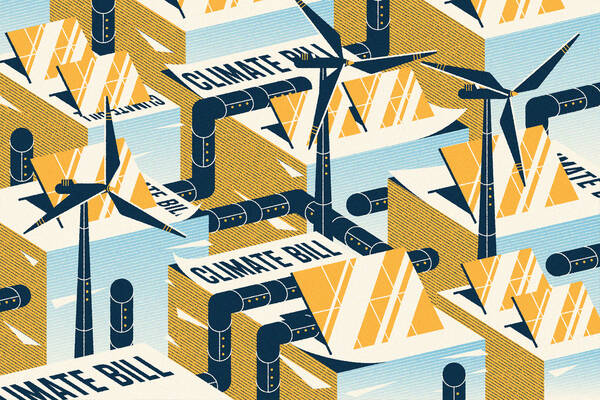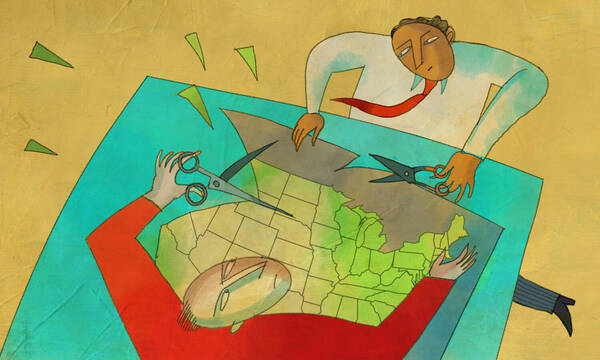Policy & the Economy

December 1, 2022
What Happens to Worker Productivity after a Minimum Wage Increase?
A pay raise boosts productivity for some—but the impact on the bottom line is more complicated.
Decio Coviello, Erika Deserranno and Nicola Persico

December 1, 2022
How COVID Changed the Way Americans Think about Economic Inequality
For some, the pandemic laid bare the social factors that can keep people down. But not everyone adopted a new perspective.
Hannah J. Birnbaum, Andrea G. Dittmann, Nicole Stephens, Ellen C. Reinhart, Rebecca M. Carey and Hazel Rose Markus

December 1, 2022
4 Science-Backed Strategies to Curb Partisan Animosity
Vilification of the other side is at a fever pitch. But research suggests ways to bridge the gap.
Eli J. Finkel and and coauthors

November 28, 2022
Post-War Reconstruction Is a Good Investment
Ukraine’s European neighbors will need to make a major financial commitment to help rebuild its economy after the war. Fortunately, as the legacy of the post–World War II Marshall Plan shows, investing in Ukraine’s future will also serve Europe’s own long-term interests.
Nancy Qian

November 1, 2022
How Experts Make Complex Decisions
By studying 200 million chess moves, researchers shed light on what gives players an advantage—and what trips them up.
Yuval Salant and Jörg L. Spenkuch

October 28, 2022
Why Are So Many Politicians Embracing Conspiracy Theories?
Conspiratorial thinking has always been attractive in times of uncertainty—but it’s become more mainstream. An expert explains why, and whether anything can be done.
Cynthia S. Wang

October 13, 2022
What the New Climate Bill Means for the U.S.—and the World
The Inflation Reduction Act won’t reverse inflation or halt climate change, but it’s still a big deal.
David A. Besanko

October 1, 2022
Who Should Win the Tug-of-War over User Data?
It’s not always clear whether businesses or consumers should have more control. Research offers a new way of thinking through the problem.
Sarit Markovich and Yaron Yehezkel

October 1, 2022
Why Did So Many Ukrainians Die in the Soviet Great Famine?
They perished at a much higher rate than ethnic Russians during what’s known as Holodomor. A new study suggests this was a deliberate policy decision.
Andrei Markevich, Natalya Naumenko and Nancy Qian

October 1, 2022
When Do People Protest and When Do They Just Grumble? History Offers Clues.
A tradition of anti-government uprisings can impact communities centuries later.
Meng Miao and Jacopo Ponticelli

October 1, 2022
How We Justify Our Unpopular Opinions
The tactic makes controversial views more palatable to others—and has implications for the rampant spread of fake news.
Leonardo Bursztyn, Georgy Egorov, Ingar K. Haaland, Aakaash Rao and Christopher Roth

September 28, 2022
China’s Future Will Reflect Russia’s
China learned from Russia’s post-1991 experience and pursued its economic liberalization with more care. But it ultimately could not avoid the political implications of pro-market policies and is now following Russia down the road to autocracy—continuing a century-long pattern of mirroring its neighbor’s historical trajectory.
Nancy Qian

September 6, 2022
One Nation, Too Divided?
Political sectarianism is rampant in the U.S. Three experts discuss whether we can remain united.
Eli J. Finkel, Cynthia S. Wang and James Druckman

September 6, 2022
The Thorny Challenge of Measuring Success in “Systems-of-Care” Networks
These networks, which help direct people to the medical and social services they need, must tread carefully in choosing which metrics to use in decision-making.
Karen Smilowitz, Michelle Shumate and and coauthors

September 1, 2022
How Humanizing Disease Could Be a New Public Health Tool
Anthropomorphizing a disease changes how we feel about it—and the steps we take to avoid it.
Lili Wang, Rima Touré-Tillery and Ann L. McGill

September 1, 2022
Could Your Political Views Stymie Your Career?
From being hired to getting a promotion, new research shows you may be penalized for disagreeing politically with the boss.
Emanuele Colonnelli, Valdemar Pinho Neto and Edoardo Teso

August 26, 2022
The Food Crisis Is Bigger Than Ukraine
While Russia’s war has undoubtedly caused real problems in global food markets, they are different and more complex than what most news coverage suggests.
Nancy Qian

August 1, 2022
For Those Living in Poverty, Therapy Can Have Benefits Beyond Mental Health
A large study suggests that cognitive behavioral therapy can also improve physical health and economic outcomes.
Nathan Baker, Bryan T. Gharad, Dean Karlan, Angela L. Ofori-Atta and Christopher Udry

August 1, 2022
How Former Enemies Can Develop Trust
A simple intervention can help diffuse animosity toward onetime armed foes, a study shows.
Emile Bruneau, Andres Casas, Boaz Hameiri and Nour Kteily

July 8, 2022
When Political Discussions Get Heated, Is It Best to Just Stay Out of It?
Keeping your head down when hot-button topics arise could come at a cost to your reputation.
Ike Silver and Alex Shaw
Insight in your inbox
Receive our newsletters to keep up with the latest research and ideas from faculty at the Kellogg School of Management.
This website uses cookies and similar technologies to analyze and optimize site usage. By continuing to use our websites, you consent to this. For more information, please read our Privacy Statement.

The Insightful Leader
November 23, 2025 · 19:20 minutes
November 7, 2025 · 17:49 minutes